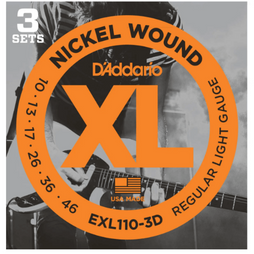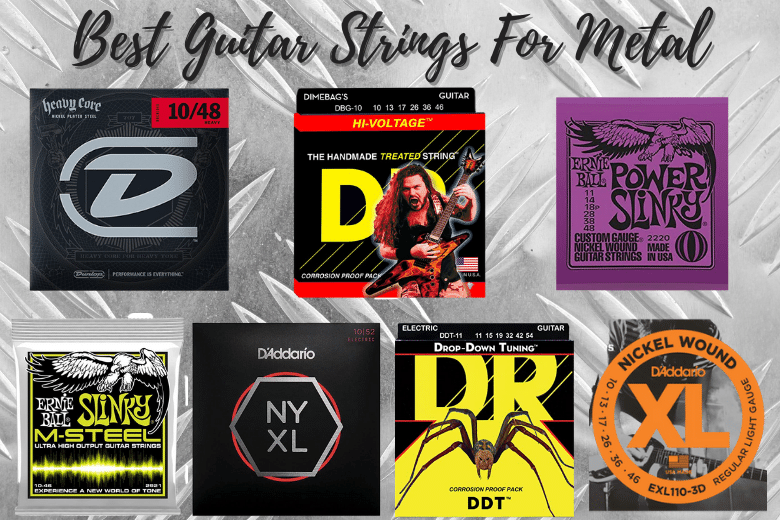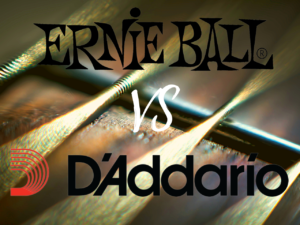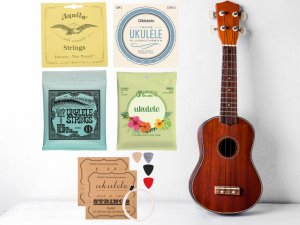This is our review on the 7 Best Guitar Strings For Metal.
Choosing the right strings is an important piece of the puzzle when it comes to your overall tone.
You can have a beautiful-sounding guitar, but if you don’t use the correct strings for the job ahead, you won’t get the best out of your instrument.
If you play metal, then this article is for you. We’ll be reviewing 7 of best guitar strings that will help bring out the beast in your guitar, and produce that heavy chugg.
Best Guitar Strings For Metal: Our Top 3 Picks
Best For Durability And Power

Best Budget Metal Strings

Best For Drop and Alternate Tunings

What String Gauge Do I Need?
Before we start with the reviews, there are a few things you should know about guitar string gauges.
First and foremost, a guitar string gauge is extremely important when it comes to how your guitar will sound and play.
If the string gauges aren’t right for your style of playing or a mismatch in the tonal department, you are going to struggle.
So, it’s imperative you choose the correct size gauge for your needs. There’s little point in choosing thicker strings, if your fingers cannot handle them. Heavy gauge strings may give you a beasty tone, but you need to work up to them.
For example, you’ll find that medium gauge strings are the standard. However, they tend to be a bit stiffer and more difficult to work with for beginners.
On the plus side though, medium-gauge strings produce a more robust sound with better volume, perfect for metal music.
By contrast, lightweight guitar strings tend to be easier to press and hold, and they are a bit more flexible if you’re going for a modern sound.
Many beginners prefer lightweight strings rather than thicker strings, until they can build up their finger strength. But even then it’s best to switch back over to medium-gauge once the calluses start building.
If you’re already a seasoned player and want the biggest sound possible, then you gotta go for a heavy set.
Our 7 Best Guitar Strings For Metal: Full Review

1- Ernie Ball M-Steel Electric Guitar Strings
Ernie Ball M-Steel Electric Guitar Strings has a unique, ultra-thin formula that you won’t find anywhere else.
The steel alloy they use is unrivaled and the strings produce high volume without losing integrity or intonation.
You’ll get excellent sustain with less finger noise than most other brands around this price tag.
A smooth memorable silky feel underneath your fingertips. If you’re starting out, this can be a good thing!
The Ernie Ball M Steel strings are perfect for high-energy performances and will last you in due to the professional build qualities.
They have a modern sound with an enhanced low-end response, so if you’re going for that heavier tone these might be the best guitar strings for your metal.
Pros
Huge reliable string maker
Good price considering the popularity of these strings
Loudest strings on the market that are perfect for playing live
Customizable for different genres
Cons
Cost’s a little more than competitors

2- DR Strings Electric Guitar Strings, Dimebag Darrell Signature
If you’re a Pantera fan, then the high-octane Dimebag Darrell Signature pack is a must for you.
You can spend all day shredding and tormenting these strings, and they’ll take everything you throw at them.
Whether you’re playing in the studio or on stage, the Dimebag Darrells will give your sound that extra oomph you need on the live circuit.
With ample sustain and a huge appetite for rock, metal, and thrash.
These strings are the real deal and won’t let you down.
The only slight criticism I have, I’ve found that these strings lack a little in mids compared to other brands.
•Long-lasting strings that are durable and won’t break the bank.
Pros
Awesome for drop tunings
Plenty of punch both rhythm and lead playing
Loud, aggressive tone that’s perfect for metal
Long-lasting strings
Cons
Mids seem too deep and distant

3- D’Addario NYXL Nickel Wound Electric Strings
The NYXL series is extremely popular with metal players.
They’re reliable and from a manufacturer that stands right at the very top of the string production list.
D’Addario NYXL strings sound best when they’re broken in. Give your guitar a day or two of playing, and you’ll reap the rewards.
So if you want to add a little extra crunch and bite to your tone. These bad boys are for you.
These are best suited for players that like to give the guitar hell. They can handle big tremolo bends and aggressive shredding. They’re also suitable to play at high volumes.
Highly recommended by the guitar-playing world.
Go on, I dare you
Pros
Probably the most popular guitar string ever!
Superior bite
Reliable for live performance
Cons
They do tend to sound better after breaking them in

4- Ernie Ball Power Slinky Electric Guitar Strings
One of the best guitar string packs for metal musicians.
These electric guitar strings are made with nickel plated steel wire wrapped around a tin-plated hex shaped steel core wire.
This type of combination is known to produce smooth, balanced tension and allow bending without fretting out or snapping easily.
Power slinky has a bright tone that suits rock, blues, and metal. Ernie Ball Power Slinky are some of the biggest selling strings on the market without a doubt.
This in itself tells you something about the quality and durability.
Pros
Huge sellers for Ernie Ball
Balanced
Brighter tone
Can handle a wider genre of music
Cons
Not specifically made for metal music

5- Dunlop Heavy Core Heavy Electric Guitar Strings
The Dunlop Heavy Core are high-quality strings that are suited best for the metal genre.
They have a distinctive tone, which is warm yet precise enough to get the accurate sound of your instrument.
The best thing about these guitar strings is they are made in the U.S, so you can be sure their quality and consistency will meet all industry standards while still being affordable for any budget
Dunlop strings gives you exactly what you expect. They’re best suited to heavy rock or blues playing styles that require the thickest of sounds from your instrument while remaining in tune at all times due to its crazy capacity to stay in tune so well.
Pros
Brighter and crisper due to the nickel plated steel build
Amazing price
Great for drop tunings
Cons
Doesn’t last as long as some of the competitors

6- D’Addario XL Nickle Wound Electric Guitar Strings
The Industry standard D’Addario XL Nickle Wound strings are still my favorite as far as being able to play almost any genre.
They are strong and suit the way I play guitar. It’s as simple as that. Does it matter how they’re built and what process they have to go through? If they’re right for you, then go with it
The XL Nickle wound is wound with nickel-plated steel and suits a wide range of musical styles. The strings in my opinion are longer lasting and can take more aggression.
The string construction combines strength and durability. The winding and steel core ensures tonal quality and longevity, unlike the competitors. There’s a reason they’re the world’s most reliable guitar strings.
A safe option for your Metal needs.
Pros
Brilliant for a wide range of rock/metal
Extremely reliable and very popular
Amazing price
Cons
Not specifically made for roaring Metal power chords

7- DR Electric Guitar Strings DDT-11
The best-selling DR strings are the DDT-11 set and they’re extremely popular for a reason.
They use one of the best core materials around (with nickel plating) called Duplex which is an alloy that’s been made to be incredibly flexible yet strong at high tension levels.
The secret lies in its proportion of nickel and steel which makes it produce a very bright sound with lots of presence.
The best thing about the DDT-11 strings is that they’re able to be used for many genres but they’re best suited for metal because of the clarity in tone and extra brightness you get when using them.
They are best paired up with an amp that has some real guts to it to get the best out of these strings. A real favorite of mine as they seem to have another gear to go to when pushed.
The DR DDT-11 are extremely durable due to their extra thick black coating which protects them from corrosion and rusting so they’re perfect for touring musicians.
3 Buying Tips For Metal Guitar Strings
In order to know which string set is best suited to your needs, there are a few factors that need to be considered.
First of all, you have the core material and this refers to how well it can transfer sound from the pickups through the neck and onto the amp.
You’ll want a strong core material like steel, nickel, or titanium because they can handle the extra tension and produce a good tone.
Secondly, you’ll need to look at the winding material which is best suited for metal players who are looking for bright sounding strings with lots of presence.
The best winding materials include stainless steel, chrome, silver copper, or gold alloys so aim for those features.
Thirdly, and most importantly, I would try a few packs out to find what is best according to your ear.
The packs are very low priced so it’s a great idea to buy 3 and see what suits your guitar best. Be carefully to check if the pack you’ve chosen are coated strings. Coated strings can last longer but they can feel thicker on the fingertip.
How To Spot Fake Strings
You may be surprised to learn that guitar strings can also get counterfeited. If you’re buying online, it’s important not just to look at the price but what is in-store for authenticity as well!
Most of these manufacturers seal each individual string inside of the pack with separate packaging.
Companies like Elixir and D’Addario also stamp quality control codes on each package that you can look for.
As you open each string, inspect it closely for signs of corrosion and poor wrapping.
Many people complain that the fake strings they receive are poorly constructed and the windings are loose right out of the package, making them difficult to play.
If the strings are properly sealed with quality control stamps, and they appear in good condition before you install them, you probably have nothing to worry about.
Getting the best guitar strings for metal is easy when you know what to look for.
Pay Attention To String Material
Metal Musicians are fond of a small variation of string materials, so it may be a good idea to stick to what’s popular with the pros.
Check out the finer details of string material. The three I’ve mentioned give the player a much-needed thick warmth and brightness, suited to chugging and a full-bodied sound.
Pure Nikel Strings
Pure Nickel is best suited for metal players who want an extremely bright sound that cuts through the mix.
Nickel Players are best served by strings built with a high proportion of nickel, usually at about 80%. They provide warmth and brightness but also give you some extra crunch to your overall tone.
The best string material is pure Nickel because it provides a perfect balance of warmth and bright tone that best suits the genre.
Nickel Plated Steel
Nickel-Plated Steel gives you the best of both worlds, providing warmth with a nice full-bodied sound but also giving you more definition in your overall tone.
So if you’re looking for guitar strings for metal then be sure to consider these factors and try out some different options before settling on one set.
- perfect balance between brightness and warmth
- nice full bodied sound with extra definition in tone
- Nickel plated steel is best suited for musicians looking for a full spectrum of sound
Stainless Steel
Stainless Steel is best suited for players looking to achieve a bright sound with lots of presence.
With a bright tone that cuts through the mix well and has an extremely crisp response.
-bright sound with lots of presence
-best suited for those looking to achieve a bright tone that cuts through the mix.
When Should I Replace My Strings?
Let’s start with the obvious, don’t wait until they break!
You should change your instrument’s strings as often as needed to keep it sounding great.
Active performers might need a new set every couple of weeks, while occasional players may wait three months before their old ones go out altogether!
Most people find that when they lose intonation or sound too mellow on an otherwise healthy guitar, then it’s time for some freshies again.
Even more importantly: if tuning becomes difficult because of poor maintenance practices – there could always be the potential danger signs indicating something has gone wrong inside.
I can always tell just by listening. The sound becomes dull and the resonance disappears. It starts to sound…well crap!
Changing one string after it breaks is not recommended as the newer string will be brighter sounding than the rest of the set.








